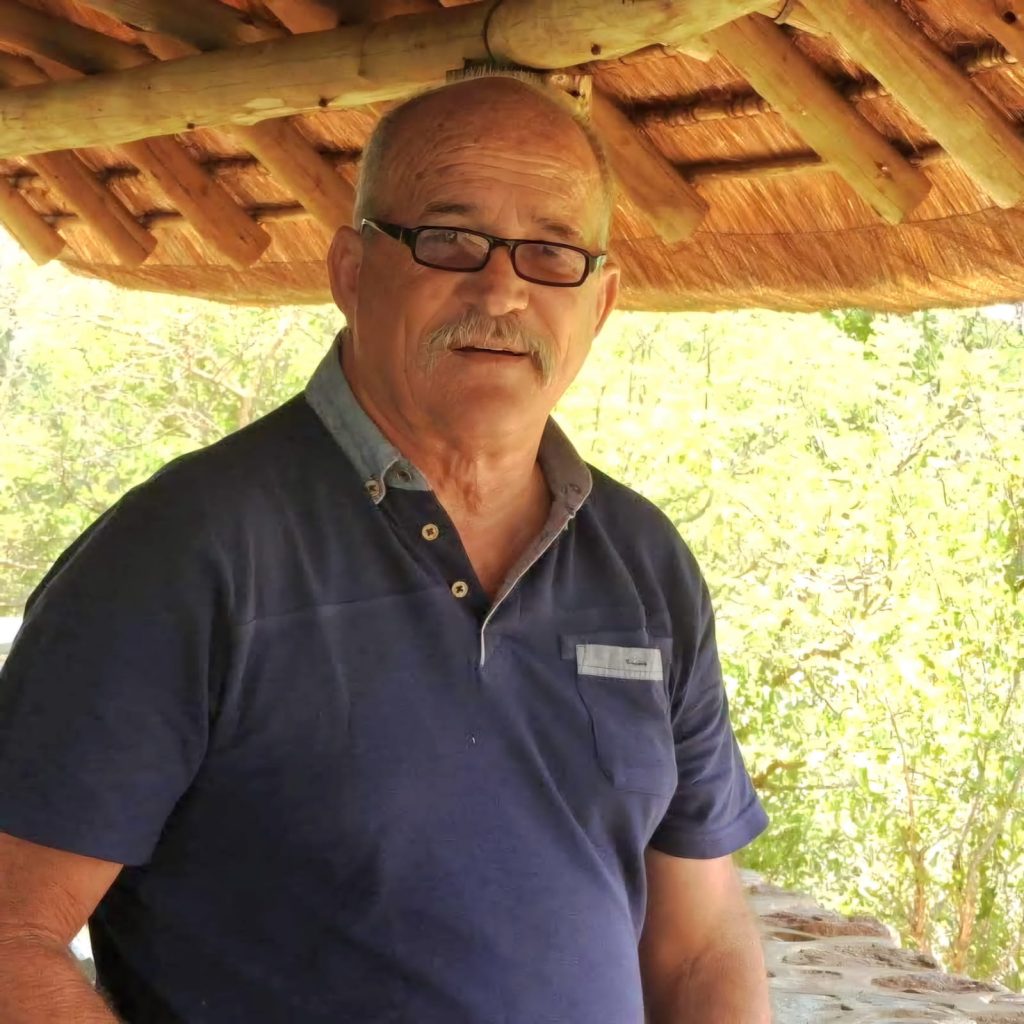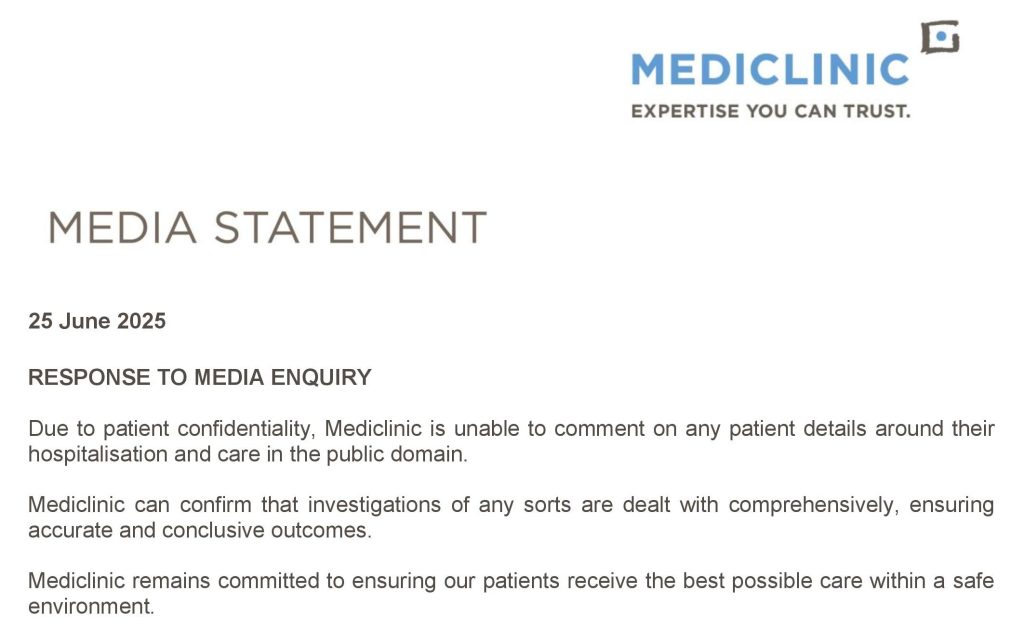
Mpumalanga, South Africa – A damning report by the Office of the Health Ombud has revealed a harrowing case of clinical negligence and systemic failure at Mediclinic Highveld Hospital in Mpumalanga, where 65-year-old patient Mr Izak Gerhardus Liebenberg died following alleged mismanagement during his hospital stay in January 2022.
The investigation, launched following a complaint by the patient’s wife, Mrs Sonja Liebenberg, concluded that Mr Liebenberg was subjected to substandard care, poor clinical oversight, and delays in critical treatment—all of which significantly contributed to his death. The Health Ombud’s report, conducted under Section 81A of the National Health Amendment Act, outlined a series of damning findings and issued urgent recommendations to prevent future occurrences.

Chronology of Neglect
Mr Liebenberg was admitted to Mediclinic Highveld on 3 January 2022 with shortness of breath and water retention. He tested positive for COVID-19 and was later diagnosed with COVID-19 pneumonitis. He had a complex medical history, including chronic kidney disease, ischemic heart disease, diabetes, hypertension, and a pacemaker in place.
Despite this high-risk profile, the investigation found that Mr Liebenberg was housed in a general ward under the care of enrolled nurses with limited scopes of practice, rather than in a high-care or ICU setting. Throughout his week-long hospitalisation, vital signs and fluid output were inconsistently monitored, and several abnormal blood test results, including a dangerously elevated International Normalised Ratio (INR) and markers of kidney failure, were either not acted upon or addressed with undue delay.
The report cites that Mr. Liebenberg’s abnormal INR of >10 was flagged at 05:44 on 9 January, yet no action was taken until after 19:00 that evening—an inexcusable delay of more than 13 hours. During this time, the patient also exhibited confusion and extreme fatigue, signs consistent with worsening renal function and uremic encephalopathy, which went largely unaddressed.
Transfer Too Late
On 10 January, Mr Liebenberg was finally transferred by ambulance to Wilgers Hospital in Pretoria after his wife’s persistent requests. Upon arrival, the receiving medical team found him severely dehydrated, delirious, and in acute renal failure requiring immediate dialysis. He was placed in the Intensive Care Unit (ICU) and started on Sustained Low-Efficiency Dialysis (SLED), but despite best efforts, he suffered a cardiopulmonary arrest and passed away on 12 January 2022.
Findings of the Report
The Ombud’s office found multiple instances of clinical mismanagement at Mediclinic Highveld, including:
- Failure to Monitor Critical Indicators: Repeated failures to adhere to strict fluid intake/output protocols, despite the patient’s known kidney failure.
- Poor Documentation and Communication: Incomplete medical records, incorrect reporting of the presence of a pacemaker, and missing or inaccurate consent forms.
- Delayed Escalation of Care: A delay of over 13 hours in addressing critical INR levels and failure to initiate dialysis or transfer to high care at an earlier stage.
- Substandard Nursing Oversight: The patient was often under the care of enrolled nurses without supervision or input from professional nurses or physicians during key periods of deterioration.
- Lack of Informed Consent: A consent form for Fresh Frozen Plasma was improperly filled, and Mr. Liebenberg—reportedly confused at the time—was not in a position to give informed consent.
Importantly, the Ombud concluded that although the exact cause of death could not be medically verified without a postmortem, the cumulative evidence pointed to a trajectory of clinical neglect that significantly worsened the patient’s condition.
Recommendations for Reform
The Health Ombud issued several critical recommendations, including:
- Disciplinary Action: The report advises that Mediclinic Highveld consider instituting disciplinary processes against healthcare staff responsible for oversight failures.
- Review of Staffing Policies: The hospital must review the practice of assigning complex cases to enrolled nurses and ensure professional nurses or physicians oversee all high-risk patients.
- Training and Capacity Building: All clinical staff must undergo training in early recognition of clinical deterioration and strict adherence to monitoring protocols.
- Improved Record Keeping: Implementation of mandatory record-keeping audits and ensuring completeness of patient records, especially regarding consent and clinical interventions.
- Policy Amendments: The hospital is to amend protocols related to the escalation of care, particularly for patients exhibiting signs of acute deterioration or abnormal laboratory results.
Response from the Family
Speaking after the report’s release, Mrs Liebenberg said, “My husband didn’t have to die like that. He trusted the hospital to help him. Instead, he was left to suffer in silence. No one listened. No one acted. This report finally acknowledges the truth we have been living with since 2022.â€
She added that she hopes the findings will spark change not just at Mediclinic Highveld, but across private hospitals in South Africa.
“This tragic case serves as a painful reminder that no matter the pressures on a healthcare system, patient dignity and safety must remain paramount.â€
Mediclinic Responds
Mediclinic Highveld issued a formal public statement at the time of publication that is included below. According to the report, several meetings were held between hospital management and Mrs Liebenberg, but she was left dissatisfied with the responses and resolution process, prompting her to escalate the matter to the Health Ombud.
A Broader Concern
This case highlights deeper systemic issues in South Africa’s private healthcare sector, particularly around the treatment of vulnerable, high-risk patients during the COVID-19 pandemic. While staff shortages and the burden of care are acknowledged in the report, the findings suggest these factors do not absolve institutions of their obligation to provide adequate and timely care.
As the Ombud emphasized in his concluding remarks, “This tragic case serves as a painful reminder that no matter the pressures on a healthcare system, patient dignity and safety must remain paramount.â€
The Bulletin reached out to the Highveld Mediclinic to discuss the findings. They requested questions to respond to. Several questions were forwarded that included questions of a more personal nature.
Although the questions below formed part of the longer, exhaustive list of questions that were submitted to Mediclinic, The Bulletin extracted these questions from the final report named “FINAL REPORT INTO ALLEGATIONS OF CLINICAL MISMANAGEMENT RESULTING IN THE DEATH OF A PATIENT AT MEDICLINIC HIGHVELD HOSPITAL REF NUMBER: 32186”
- Were any health practitioners identified by Mediclinic Highveld (MH) that did not perform their duties diligently and in accordance with clinical and ethical guidelines when providing care to Mr. Liebenberg?
- If so were disciplinary action taken and in what form?
- Was this disciplinary action reported as ordered?
- Did MH put measures in place to monitor, safeguard, and evaluate proper record-keeping of all patients’ medical records?
- Was the recommendation done that MH should develop a Standard Operating Procedure (SOP) on how to handle and manage laboratory abnormal blood results with urgency?
- Was the recommendation that MH should provide Mrs Liebenberg and her daughter with psychosocial support services to help them deal with the loss of their loved one in the given circumstances adhered to?
- Was any apology offered to Mrs Libenberg regarding the matter?

The following response was received from Mediclinic:
RESPONSE TO MEDIA ENQUIRY
Due to patient confidentiality, Mediclinic is unable to comment on any patient details around their
hospitalisation and care in the public domain.
Mediclinic can confirm that investigations of any sorts are dealt with comprehensively, ensuring
accurate and conclusive outcomes.
Mediclinic remains committed to ensuring our patients receive the best possible care within a safe
environment.